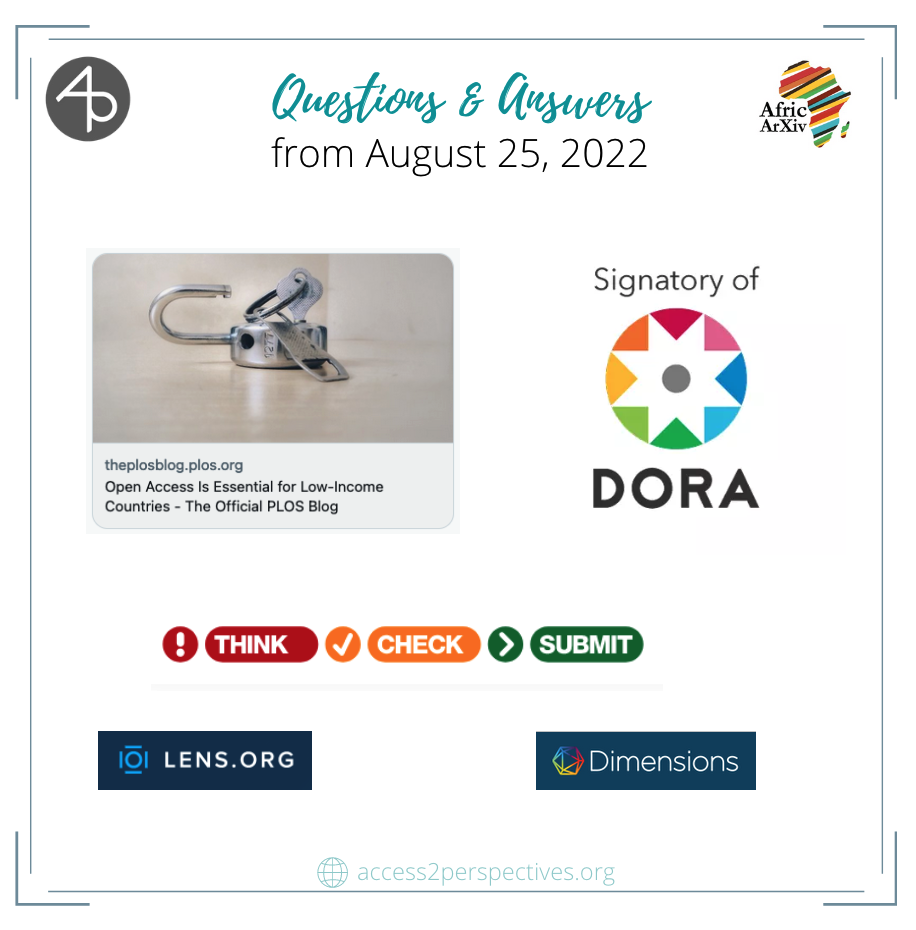
As recently announced, we are holding weekly Q&A sessions with Access 2 Perspectives, every Thursday at 3 pm UTC+2. You are most welcome to register and ask anything about Open Science and research project management.
Register at bit.ly/a2p-free-weekly-QandA to receive weekly reminders for each session. Here is a summary from yesterday’s Q&A, in which we discussed Open Access literature discovery, incentives for ECRs to publish Open Access, and making an informed decision about where to publish amongst other topics.
Here is a short introduction to Access 2 Perspectives from yesterday’s Q&A session with Jo and Outa:
You can access the slides at https://docs.google.com/presentation/d/1QkvxD_9G14B5R21704sS_nA2XzpxLRut3OUs5uATeyU/edit#slide=id.g14752722112_0_0 and thereby also all weblinks mentioned in the talk.
We had a question from a participant about a recent publication in the purely Open Access publisher PLOS about dissemination and use of Open Access literature.
Simard M-A, Ghiasi G, Mongeon P, Larivière V (2022) National differences in dissemination and use of open access literature. PLoS ONE 17(8): e0272730. https://doi.org/10.1371/journal.pone.0272730
Related PLOS Blog post: https://theplosblog.plos.org/2022/08/open-access-is-essential-for-low-income-countries/
While the title and topic as well as the results are highly interesting and relevant, concerns were raised about the approach by the authors. Instead of (or complementary to) Web of Science, the authors could have looked into the Dimensions.ai and Lens.org datasets, both of which are openly accessible and searchable. Why rely on a closed and proprietary system to make a case about Open Science and Open Access? However, we acknowledged that WoS might still be the most widely known and utilized, despite the restrictions, and despite the availability of many other research literature discovery tools, such as SciELO, OpenKnowledge Maps, BASEsearch, The Lens, Dimensions, ScienceOpen, etc.
It probably comes down to a matter of awareness of the alternatives that are already available. The question remains if the authors were aware of those and chose WoS either for its usability and analytical features and because they themselves are already familiar with operating it, or to present something that most readers would find easy to relate to because they presumably use WoS themselves and thus would not have to learn ‘yet another’ system.
At Access 2 Perspectives, we aim to highlight the alternatives, while at the same time acknowledging what we can learn from established tools to provide you with insights that allow you to make informed decisions abot using one system over the other on the road towards Open Science and F.A.I.R. research management.
Other questions and comments from this week’s Q&A session:
Q: For an application (in this case for an online course on media research) where a reference person is needed, and due to given circumstances cannot be provided, can I still apply without the reference?
A: You can add a disclaimer briefly commenting why reference cannot be listed, e.g. not enough practical research experience and supervision due to nationa£l crisis situation, still early in the career, etc. AND/OR the reference persons might be unavailable or at risk by disclosing their names, etc. Another option would be to simply state: “References are available upon request”. Ask the people you would like to list as references beforehand if they are willing to testify to your skills and research accomplishments when contacted by a future employer or research team leader.
Short report from the Swiss Open Science Summer School: openscience-summerschool.ch/en/events/summer-school-2022/
Q: Many ECRs mentioned that they find it difficult to publish Open Access due to the incentives and restrictions given in their research environments to publish in high-impact factor journals. How can we better support them to encourage publications in journals primarily selected for the scope of research, instead of prestige?
A: It takes time to change the tide and an institutional setting. Good references to empower researchers, incl. ECRs, are sfdora.org/read/ – see also the list of signers and if colleagues from the same institution or university and country) and of course, the checklist at thinkchecksubmit.org to make an informed choice for the best journal to publish in.
To join our upcoming Q&A you can register at bit.ly/a2p-free-weekly-QandA to receive weekly reminders for each session until the end of 2022.
View all upcoming events on our calendar at access2perspectives.org/events/

0 Comments